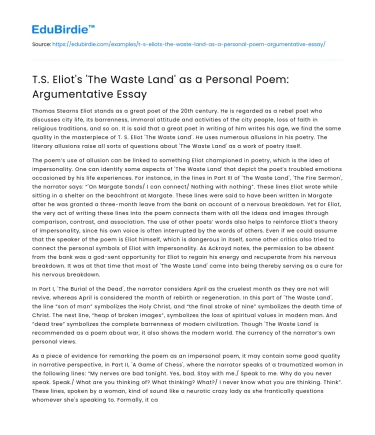Thomas Stearns Eliot stands as a great poet of the 20th century. He is regarded as a rebel poet who discusses city life, its barrenness, immoral attitude and activities of the city people, loss of faith in religious traditions, and so on. It is said that a great poet in writing of him writes his age, we find the same quality in the masterpiece of T. S. Eliot 'The Waste Land'. He uses numerous allusions in his poetry. The literary allusions raise all sorts of questions about 'The Waste Land' as a work of poetry itself.
The poem’s use of allusion can be linked to something Eliot championed in poetry, which is the idea of impersonality. One can identify some aspects of 'The Waste Land' that depict the poet’s troubled emotions occasioned by his life experiences. For instance, in the lines in Part III of 'The Waste Land', 'The Fire Sermon', the narrator says: “'On Margate Sands/ I can connect/ Nothing with nothing”. These lines Eliot wrote while sitting in a shelter on the beachfront at Margate. These lines were said to have been written in Margate after he was granted a three-month leave from the bank on account of a nervous breakdown. Yet for Eliot, the very act of writing these lines into the poem connects them with all the ideas and images through comparison, contrast, and association. The use of other poets’ words also helps to reinforce Eliot’s theory of impersonality, since his own voice is often interrupted by the words of others. Even if we could assume that the speaker of the poem is Eliot himself, which is dangerous in itself, some other critics also tried to connect the personal symbols of Eliot with impersonality. As Ackroyd notes, the permission to be absent from the bank was a god-sent opportunity for Eliot to regain his energy and recuperate from his nervous breakdown. It was at that time that most of 'The Waste Land' came into being thereby serving as a cure for his nervous breakdown.
Save your time!
We can take care of your essay
- Proper editing and formatting
- Free revision, title page, and bibliography
- Flexible prices and money-back guarantee
In Part I, 'The Burial of the Dead', the narrator considers April as the cruelest month as they are not will revive, whereas April is considered the month of rebirth or regeneration. In this part of 'The Waste Land', the line “son of man” symbolizes the Holy Christ, and “the final stroke of nine” symbolizes the death time of Christ. The next line, “heap of broken images”, symbolizes the loss of spiritual values in modern man. And “dead tree” symbolizes the complete barrenness of modern civilization. Though 'The Waste Land' is recommended as a poem about war, it also shows the modern world. The currency of the narrator’s own personal views.
As a piece of evidence for remarking the poem as an impersonal poem, it may contain some good quality in narrative perspective, in Part II, 'A Game of Chess', where the narrator speaks of a traumatized woman in the following lines: “My nerves are bad tonight. Yes, bad. Stay with me./ Speak to me. Why do you never speak. Speak./ What are you thinking of? What thinking? What?/ I never know what you are thinking. Think”. These lines, spoken by a woman, kind of sound like a neurotic crazy lady as she frantically questions whomever she's speaking to. Formally, it can even say that the character of the poem experiences a breakdown in the same way the narrator speaking seems to have a mental breakdown. But Eliot later dismissed the poem as a personal ‘grouse’ against life – contrary to what a hundred analyses of ‘The Waste Land’ argued, the poem didn’t pretend to speak for a whole generation.
A hasty conclusion would mean that Eliot is schizophrenic. As a critic, he defends the ‘impersonal theory of poetry’, but as a poet, he works in a totally different mode. This point implies that his criticism is a cover rather than an elucidation of his poetry, a situation that has lured for almost half a century. As Eliot himself has rightly argued, a poem is meant to be a celebration of influence and multiplicity. The first danger is that of assuming that there must be just one interpretation of the poem as a whole, which must be right. But as for the meaning of the poem as a whole, it is not exhausted by any explanation, for the meaning is what the poem means to different sensitive readers.






 Stuck on your essay?
Stuck on your essay?

